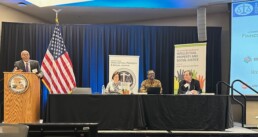Blog Post: The White House Initiative to Promote Excellence and Innovation at Historically Black Colleges and Universities - Ensuring the Broadest Participation in the American IP and Innovation Ecosystem
The White House Initiative to Promote Excellence and Innovation at Historically Black Colleges and Universities: Ensuring the Broadest Participation in the American IP and Innovation Ecosystem
On April 23, 2025, President Trump issued an Executive Order entitled “The White House Initiative to Promote Excellence and Innovation at Historically Black Colleges and Universities.” The White House HBCU Initiative reflects the Administration’s acknowledgement of and support for the critical role that HBCU institutions continue to play in ensuring that all Americans enjoy the opportunity to excel through and contribute to the national advancement, including through participation in the American IP regime and Innovation Ecosystem.
The White House HBCU Initiative expressly recognizes that “Historically Black Colleges and Universities (HBCUs) remain integral to American students’ pursuit of prosperity and wellbeing, providing the pathway to a career and a better life.” Through the Initiative, the Trump Administration pledges to “continue the work begun during [the] first [Trump] Administration to elevate the value and impact of our Nation’s HBCUs as beacons of educational excellence and economic opportunity that serve as some of the best cultivators of tomorrow’s leaders in business, government, academia, and the military.”
Among The White House HBCU Initiative’s core goals include “providing professional development opportunities for HBCU students to help build America’s workforce in technology, healthcare, manufacturing, finance, and other high-growth industries…working to advance…key priorities related to promoting innovation and excellence throughout HBCUs in consultation with HBCU leaders, representatives, students, and alumni [and] collaborating with agencies to improve the competitiveness of HBCUs for other sources of Federal research and development funding”.
Just as IP achievement remains at the forefront of American advancement in science, and technology, and the arts, The White House HBCU Initiative is an important component of a comprehensive strategy for ensuring that all Americans enjoy meaningful opportunities through which to develop and exploit their innovative and artistic talents, through academic research and technology transfer, and other entrepreneurial commercialization of their resulting accomplishments.
Through The White House HBCU Initiative, the Trump Administration takes an important step towards ensuring that every American cohort, including rural communities, veterans, elder citizens, and those who have educated themselves in non-elite or non-traditional settings, such as trade schools, and community colleges, as well as in more traditional HBCU settings, are all able to enjoy the opportunity and the privilege to participate in and contribute to America’s innovation and artistic storehouse.
IIPSJ commends the Trump Administration for this effort to effectuate a balanced approach to promoting nationwide IP engagement fully consonant with the IIPSJ Mission. We hope you will review the full text of “The White House Initiative to Promote Excellence and Innovation at Historically Black Colleges and Universities.”
2025 IP & Social Justice CLE Recap
“IIPSJ’s annual conferences played an important role in developing a social justice perspective in intellectual property law and policy. The Institute’s mission is a vital one”- Honorable Raymond T. Chen
For the 22nd Annual IP and Social Justice CLE Program, co-hosted by law firm Finnegan, Henderson, Farabow, Garrett & Dunner LLP, key attendee sessions included: (a) our Annual IP Year in Review, (b) Social Justice Luncheon Plenary Sessions: IP Social Justice in Legal Practice: Preparing Practitioners for Contemporary Challenges, and (c) the Annual Donald R. Dunner Judicial Panel, which included insights and reflections from the Honorable Leonard P. Stark, Judge with the United States Court of Appeals for the Federal Circuit, the Honorable Kara F. Stoll, Judge with the United States Court of Appeals for the Federal Circuit, and the Honorable Susan G. Braden, Former Chief Judge (retired) of the United States Court of Federal Claims.
The IP and Social Justice CLE Conference benefits from participation from all demographics within the IP legal community: attorneys in private practice, in-house counsel corporate departments, government agencies, and public interest NGOs, as well as members of the judiciary and government officials. The CLE Program was co-chaired by Tashia Bunch, Esther H. Lim, and Idris N. McKelvey.
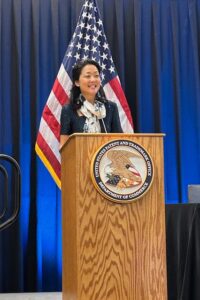
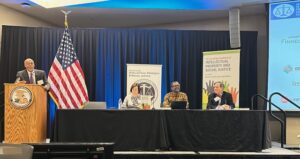
IP Social Justice Lifetime Achievement Award:
The Institute for Intellectual Property and Social Justice honored Patricia Carter Ives Sluby, L.H.D. with a IP Social Justice Lifetime Achievement Award. Dr. Sluby joined the US Patent and Trademark Office as a patent examiner in the early days of the Equal Employment Opportunity program and later achieved the primary status followed by a special programs Patent Cooperation Treaty examiner. Upon leaving the USPTO she became a registered patent agent.
Dr. Sluby began compiling information on African American inventors, including women inventors and published articles in patent office journals and many other national publications including the 1990 Bicentennial Celebration—United States Patent and Copyright Laws Proceedings, Events and Addresses. She self-published her first book in 1987, Creativity and Inventions: The Genius of Afro-Americans and Women in the United States and their Patents. and after retirement published books in 2004, The Inventive Spirit of African Americans, and 2011, The Entrepreneurial Spirit of African American Inventors. Pat herself holds 22 registered copyrights. She is co-curator of the exhibit, Patented Ingenuity: The Art of African American Inventors, at the Prince George’s African American Museum and Cultural Center.
Dr. Sluby is past president of the National Intellectual Property Law Association, educating the minority community in IP, placement of IP professionals, and legislation, and member of the board of directors of the Museum for Black Innovation and Entrepreneurship. She has appeared widely on radio, TV, and internet programs, once serving as the spokesperson for the USPTO on CNN. She has also served as a contributing editor of the journal of the National Society of Black Engineers.
Her distinguished service includes Department of Commerce Science and Technology Fellow, serving on the subcommittee on Domestic Monetary Policy for the U.S. House of Representatives Committee on Banking, Finance, and Urban Affairs where she drafted a bill to place the first woman bank president in the US on a coin and special director in the Office of Cultural Resources of the National Park Service.
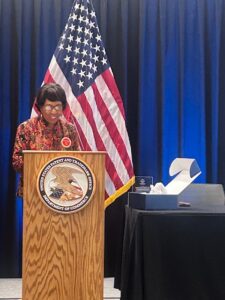
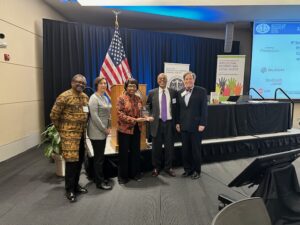
The 2025 CLE Sessions were:
• Key Highlights of 2024: Patent, Trademark, and Copyright
• Donald R. Dunner Judicial Panel
• IP Social Justice in Legal Practice: Preparing Practitioners for Contemporary Challenges
• Trademark, Entertainment, and NIL
• Perspectives on The Rise of Trade Secrets
• Al and Impacts on Patent System Inclusion
• Ethics
View the session video for IP Social Justice in Legal Practice: Preparing Practitioners for Contemporary Challenges here.
Thank you to our sponsors!

![]()
![]()
![]()
![]()



Blog Post: IIPSJ Co-Sponsors 2025 Race + IP Conference
IIPSJ Co-Sponsors 2025 Race + IP Conference

The Institute for Intellectual Property and Social Justice (IIPSJ) is excited to announce that it is a co-sponsor of the 2025 Race + IP Conference.
Race + IP is a conference dedicated to cultivating community and collaboration around the study of race, coloniality, and intellectual properties. The fifth anniversary conference, Race + IP ’25: Abolitionist Futures, scheduled for April 17-19, 2025 at the University of Pittsburgh, asks what it means to think about the transformative justice term “abolition” alongside “intellectual property,” or perhaps more aptly “knowledge governance.”
As a conference speaker, IIPSJ Founder and Director Lateef Mtima will support this important conversation, aspiring to encourage a shift in the socio-legal conceptualization of intellectual property as space to be policed and imagining how it can be reimagined through new frameworks that emphasize reparation without punishment.
Registration is free, and attendees can participate in person or virtually.
Learn more about the 2025 conference here.
Register for the conference here.


